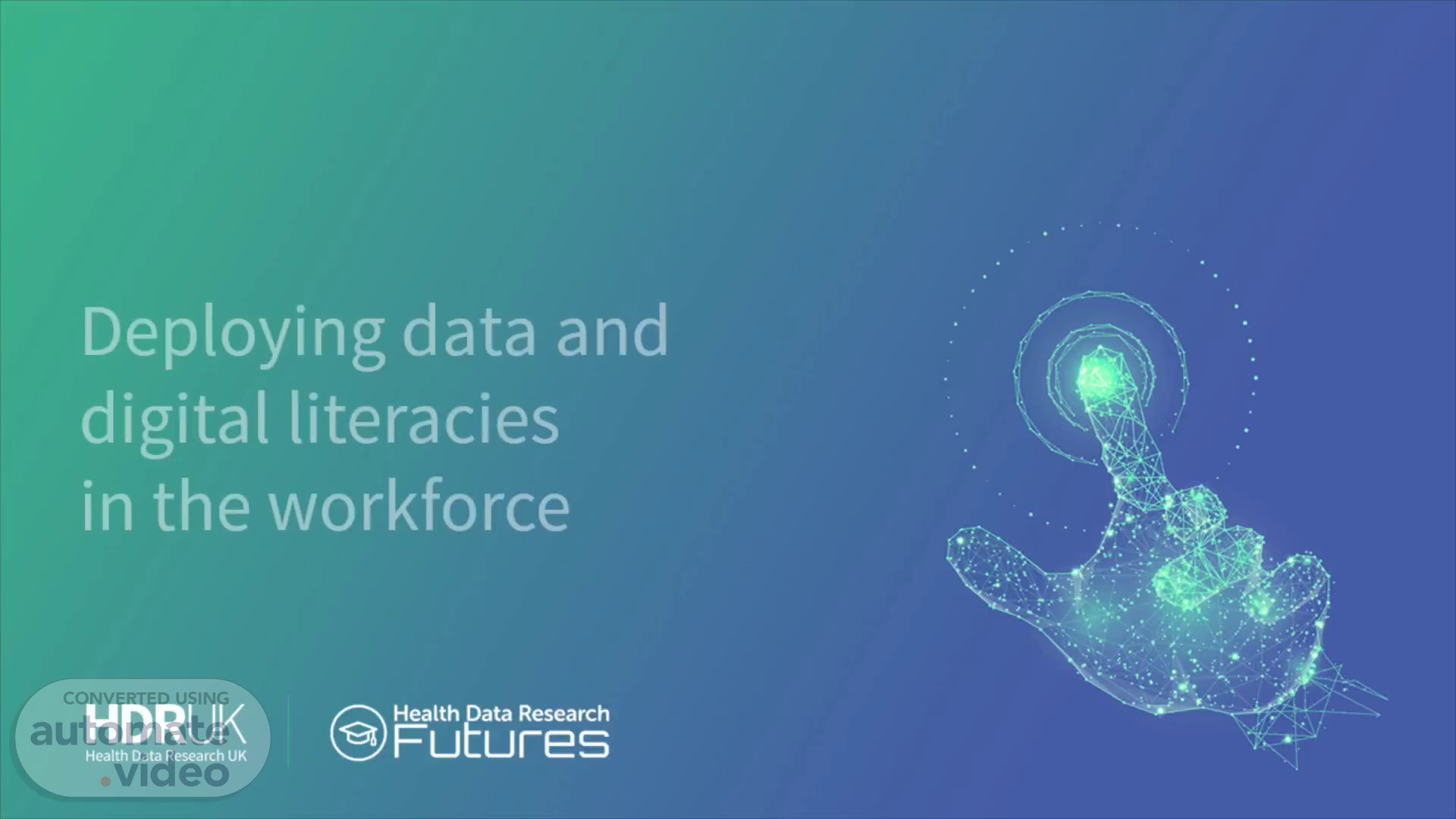
Deploying data and digital literacies in the workforce
Scene 1 (0s)
Deploying data and digital literacies in the workforce.
Scene 2 (7s)
Introduction. Data and digital literacy capability frameworks in healthcare 21st Century skills and capabilities in digital transformation projects Communication methods and approaches to develop competencies in healthcare.
Scene 3 (19s)
Data and digital literacy: why are they important?.
Scene 4 (26s)
The importance of digital and data literacy. Educational resources should be developed to educate and train all healthcare professionals in: Health data provenance, curation, integration and governance The ethics of AI and autonomous systems/tools Critical appraisal and interpretation of AI and robotics technologies.
Scene 5 (45s)
Heading. Appetite for knowledge in advanced statistics, population health management and artificial intelligence amongst healthcare workers.
Scene 6 (1m 8s)
Existing frameworks.
Scene 7 (1m 13s)
The evolution of the digital literacy framework. Profession specific frameworks Clinical informaticians Allied health professionals Pharmacists Psychological practitioners Health analysts.
Scene 8 (1m 29s)
Moving to working with technology. Human Factors (people, culture, and processes) Ethical and Regulatory considerations Digital transformation maturity Artificial Intelligence (A1) and robotics Digital Health and scxial care technology Healthcare data management Digital.
Scene 9 (1m 45s)
Skills and capabilities for real world digital transformation.
Scene 10 (1m 52s)
Stages of ‘digital ready’ transformation. Individual attitudes.
Scene 11 (2m 3s)
Cultural shift towards technological transformation.
Scene 12 (2m 25s)
Cultural shift towards technological transformation.
Scene 13 (2m 34s)
Cultural shift towards technological transformation.
Scene 14 (2m 42s)
Cultural shift towards technological transformation.
Scene 15 (2m 52s)
Strategies for moving from capability frameworks to education.
Scene 16 (2m 59s)
Strategy 1: Empower individual learners. Provide or guide them to: Self-assessment tools Online education platforms Hands-on advanced learning opportunities.
Scene 17 (3m 11s)
Strategy 2: Use educational and professional bodies.
Scene 18 (3m 24s)
Strategy 3: Use employers. Engage with them to encourage: Core and mandatory training Professional development Transforming culture Annual reviews and appraisals.
Scene 19 (3m 36s)
Archetypes for strategic change. Source: Adapted from Davies, Abdulhussein et al (2023).
Scene 20 (3m 59s)
Summary.
Scene 21 (4m 4s)
VIDEO EDITOR: Full screen talking head.
Scene 22 (4m 11s)
References. Topol E (2019) ‘Preparing the healthcare workforce to deliver the digital future’. An independent report from The Topol Review/NHS, on behalf of the Secretary of State for Health and Social Care https://topol.hee.nhs.uk/wp-content/uploads/HEE-Topol-Review-2019.pdf [accessed 25 April 2023] ‘The rise of the data-driven physician’, Stanford Medicine 2020 Health Trends Report (2020) https://med.stanford.edu/content/dam/sm/school/documents/Health-Trends-Report/Stanford%20Medicine%20Health%20Trends%20Report%202020.pdf [accessed 25 April 2023] Beetham (2017)’Jisc Digital capabilities framework: the six elements’ https://digitalcapability.jiscinvolve.org/wp/2017/03/09/digital-capabilities-framework-an-update/ [accessed 25 April 2023] ‘What is digital literacy?’ Health Education England (2023) https://digital-transformation.hee.nhs.uk/building-a-digital-workforce/digital-literacy/what-is-digital-literacy [accessed 25 April 2023].
Scene 23 (4m 53s)
References. Davies, Abdulhussein , Davies, Nix and Painter, ‘AI and Digital Healthcare Technologies Capability Framework’, Health Education England (2023) https://www.hee.nhs.uk/news-blogs-events/news/ai-digital-healthcare-technologies-capability-framework-published [accessed 25 April 2023] Nix, Onisiforou and Painter, ‘Understanding healthcare worker confidence in AI’, Health Education England (2022) https://digital-transformation.hee.nhs.uk/binaries/content/assets/digital-transformation/dart-ed/understandingconfidenceinai-may22.pdf [accessed 25 April 2023].